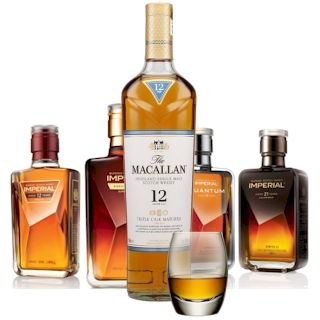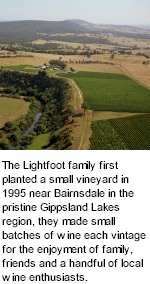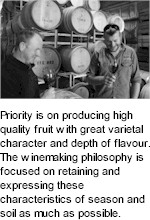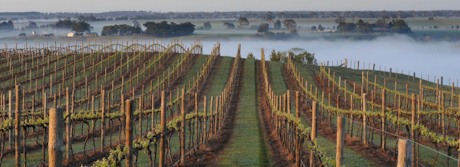


Gippsland as a wine region defies easy classification. It is technically a zone under the Australian GI system, rather than a winegrowing region of its own. The area is large and viticultural areas dispersed, however, throughout all precincts of Gippsland, Pinot Noir and Chardonnay are the predominate grape varieties. The Bairnsdale sub region has lower annual rainfall than the rest of Gippsland and enjoys coastal climate which provides sea breezes throughout the growing season. Bairnsdale's cool semi maritime climate has proven to be particularly well suited for Pinot Noir and cool climate styles of Chardonnay and Shiraz.

The Lightfoot family first planted a small vineyard in 1995 near Bairnsdale in the pristine Gippsland Lakes region, they made small batches of wine each vintage for the enjoyment of family, friends and a handful of local wine enthusiasts. The family's favourite pasttime turned into a business which grew and grew. The second generation, sons Rob and Tom Lightfoot, now manage the enterprise. Alastair brings more than 25 years winemaking experience to the winery, working previously in the Yarra and Hunter Valleys.
After completing a Viticultural Science and Wine Production degree, Tom Lightfoot has worked a number of vintages in wineries throughout Australia and the Northern Hemisphere. Tom now manages the Myrtle Point Vineyard and assists Alastair in winemaking.
The Lightfoot & Sons Myrtle Point vineyards lie within easy view of Gippsland Lakes. The vineyard site, situated between the foothills of the Great Dividing Range and Bass Strait, was selected when soil mapping of the region identified tracts of precious Terra Rosa over limestone soil structure. The 29 hectare Myrtle Point vineyard was established between 1995-1997, Pinot Noir plantings make up almost half, with smaller bocks of Chardonnay, Cabernet and Shiraz.

Good annual rainfall of around 700mm and a regular coastal breeze throughout the growing season provides good airflow within the canopy and assists in the natural management of healthy vines. Shoot thinning and crop thinning when required, along with and limited use of irrigation, help maintain low cropping levels of less than 2 tonnes per acre. The maritime influence in the vineyard has a moderating effect on the cool climate and enables fruit to develop flavours of great varietal character.
The winemaking process begins in the vineyard. Priority is on producing high quality fruit with great varietal character and depth of flavour. The winemaking philosophy is focused on retaining and expressing these characteristics of season and soil as much as possible. Lightfoot & Sons wines are made exclusively from estate grown grapes. Using pure estate grown fruit allows complete management of the entire winemaking process, from early in the season as vines make fruitset, right through to the end of the winemaking process. This ensures that the finished Lightfoot & Sons wines remain of the highest quality and can articulate an uncompromised expression of vineyard and vintage.
Depending on vintage, Lightfoot & Sons may employ a combination of both wild and inoculated yeasts, small format fermenters are hand plunged, inclusion of whole bunches and a restrained use of new French oak, achieves wines of true varietal flavour and environmental character, fine texture and engaging complexities within the wine.
